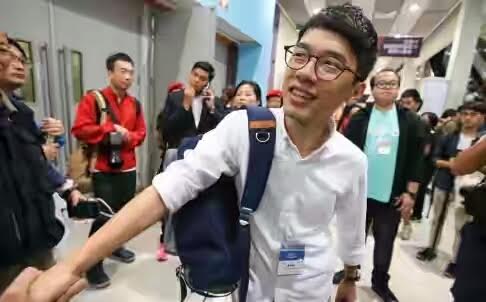-
Tips for becoming a good boxer - November 6, 2020
-
7 expert tips for making your hens night a memorable one - November 6, 2020
-
5 reasons to host your Christmas party on a cruise boat - November 6, 2020
-
What to do when you’re charged with a crime - November 6, 2020
-
Should you get one or multiple dogs? Here’s all you need to know - November 3, 2020
-
A Guide: How to Build Your Very Own Magic Mirror - February 14, 2019
-
Our Top Inspirational Baseball Stars - November 24, 2018
-
Five Tech Tools That Will Help You Turn Your Blog into a Business - November 24, 2018
-
How to Indulge on Vacation without Expanding Your Waist - November 9, 2018
-
5 Strategies for Businesses to Appeal to Today’s Increasingly Mobile-Crazed Customers - November 9, 2018
Anti-Beijing Lawmakers Win Seats in Hong Kong Elections
It saw the emergence of young campaigners demanding outright independence for Hong Kong – a subject which was taboo until recently – offering the chance for the city to determine its own future.
Advertisement
Pro-establishment lawmakers such as Ms Elizabeth Quat said she hoped the issue of splitting from China would not enter the legislature or it could damage Hong Kong’s economic interests.
Before Sunday’s vote, six candidates were disqualified for their deemed pro-independence stances after a new Electoral Affairs Commission ruling requiring those running to sign a document accepting Hong Kong as “an inalienable part of China”.
They see no way for Hong Kong to maintain its civil liberties under the current arrangement.
Last winter, Chinese security abducted five men in Hong Kong who published books against members of the central government.
This LegCo election, the first since the 2014 Occupy protests, was considered to be the most important one in Hong Kong’s history since the city was handed back over to China.
“The democracy in the election is reflected by the free choice of voters, they do not need to be told who to vote”, he said, when asked his thoughts on how last-minute decisions by seven mostly pro-democracy candidates to suspend their campaigns in a bid to consolidate votes for those with more support would affect results.
“It’s bleak, but I think if China doesn’t leave us to do what we want, I think the only way is to fight for independence”, Aron Yuen, a 34-year-old college lecturer, said as he stood in line Sunday with about 100 other people to cast their ballots.
That disillusion, exacerbated by the failure of the 2014 rallies to win political reform, has spawned a slew of new parties calling for more autonomy.
Voters flocked to cast ballots in record numbers with some having to wait several hours after the close of polling to cast ballots at a few particularly congested polling stations.
It was especially hard for any pro-independence candidate to win because the Chinese government forced all candidates to sign a pledge accepting that Hong Kong belonged to China.
An initial count on Monday also suggested Hong Kong’s pro-democracy opposition might retain its crucial one-third veto bloc in the 70-seat Legislative Council over major pieces of legislation and public funding that has helped check China’s influence.
However, the pro-China contingent will continue to dominate the legislature, as they hold on to their seats in the functional constituency.
At least three of the young leaders who took the front row in the 2014 pro-democracy protests have been elected to Hong Kong’s Legislative Council or LegCo – the majority of which holds the power to veto certain legislations in the territory.
Nominees were competing for 70 seats on the LegCo, which passes budgets and laws. “That is my political goal in Hong Kong”.
A record 2.2 million people voted in the city-wide legislative election as fears grow that Beijing is tightening its grip on the semi-autonomous city in a range of areas, from politics to education and media.
Advertisement
Most established pro-democracy politicians do not support the notion of independence and may lose seats to voters who now favour more radical new groups.





























